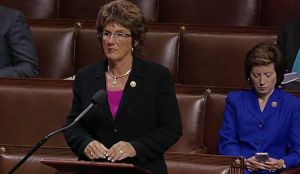 U.S. Representative Jackie Walorski (R-Ind.) Wednesday released the following statement after the House passed bipartisan legislation to overhaul the Internal Revenue Service (IRS), including a measure Walorski introduced to strengthen IRS accountability for modernizing its information technology (IT) systems:
U.S. Representative Jackie Walorski (R-Ind.) Wednesday released the following statement after the House passed bipartisan legislation to overhaul the Internal Revenue Service (IRS), including a measure Walorski introduced to strengthen IRS accountability for modernizing its information technology (IT) systems:
“The first priority of the IRS should be serving taxpayers, but it can’t do that with decades-old technology and a broken process. Repeated failures, delays, and cost overruns have opened up a trust gap between the IRS and the American people. This bipartisan legislation is a big step toward bringing the IRS into the 21st century, restoring a culture of accountability, and putting taxpayers first.”
BACKGROUND
The House passed the 21st Century IRS Act (H.R. 5445) by a vote of 414 to 3. This bipartisan legislation contained Walorski’s bill, the IRS Information Technology Accountability Act (H.R. 5362), which aims to prevent delays and cost overruns by strengthening accountability measures and codifying the role and responsibilities of the IRS’s chief information officer (CIO). The IRS relies on several legacy IT systems, some dating back to the 1960s, but has struggled to complete major IT modernization projects despite spending approximately $2.4 billion annually on IT.
The House also passed the Taxpayer First Act (H.R. 5444) by a vote of 414 to 0. The bipartisan bill would redesign the organizational structure of the IRS, strengthen taxpayer rights, and improve customer service.
Video of Walorski speaking about the legislation on the House floor ahead of today’s vote is available here. The full text of her remarks is below.
“Thank you, Mr. Chairman. Mr. Speaker, I rise in strong support of this bipartisan IRS reform package, including the 21st Century IRS Act.
“There’s a trust gap between taxpayers and the IRS, and the IRS’s information technology systems are a good example of why. The IRS has an urgent need to overhaul its IT systems, some of which date back to the Kennedy administration, but repeated mistakes big and small undermine our trust in them.
“Take the $12 million they spent on a new email system they couldn’t use. The inspector general report revealed the IRS bought it “without first determining project infrastructure needs, integration requirements, business requirements…and whether the subscriptions were technologically feasible.”
“Or take the Return Review Program, or RRP. The new fraud detection program came in years behind schedule and hundreds of millions of dollars over-budget. Here are just a few of the reasons the IRS cited when it put the RRP into a “strategic pause” in 2014:
To “[determine] the priority and direction from IRS senior leadership”;
“To articulate and align on RRP’s role in the broader business vision”;
“To ensure clear and concise understanding of scope, cost, and schedule” with contractors;
And, finally, budgetary constraints.
“Mr. Speaker, unforced errors are turning vital projects into boondoggles. We could be applauding the IRS for buying a system off-the-shelf. Instead, we’re scolding them for not asking the most basic questions before buying it.
“I hear complaints about the IRS’s budget and I think about RRP. Senior leadership gave no direction, no one knew how it fit into the big picture, and contractors were out of the loop. Everyone essentially ran in circles until they ran out of money. You know what? More money can’t fix failed leadership or a broken culture. Better guidelines, codified roles, and more intentional strategic planning can.
“That’s why I introduced H.R. 5362, the IRS Information Technology Accountability Act, and I’m thankful it was included in the 21st Century IRS Act. My bill takes some important steps to prevent future boondoggles and instill accountability, including:
Codifying the responsibilities of the Chief Information Officer, or CIO;
Requiring the CIO to develop, implement, and update a multiyear I.T. strategic plan;
And requiring regular coordination between the CIO and Chief Procurement Officer.
“It also singles out two major projects for independent verification and validation. The first, CADE 2, is still years from completion after almost a decade and $1 billion spent. The other, Enterprise Case Management, is a system that was supposed to be used agency-wide but was suspended because the IRS bought software that couldn’t be used agency-wide. These projects need to be on a better trajectory.
“Mr. Speaker, I’m proud we’re taking important, bipartisan steps to close the IRS’s trust gap. I want to thank Chairman Brady, Chairman Jenkins, and Mr. Bishop for all their hard work on this bill. I urge my colleagues to support the 21st Century IRS Act and I yield back.”
Walorski represents the 2nd Congressional District of Indiana, serving as a member of the House Ways and Means Committee.











